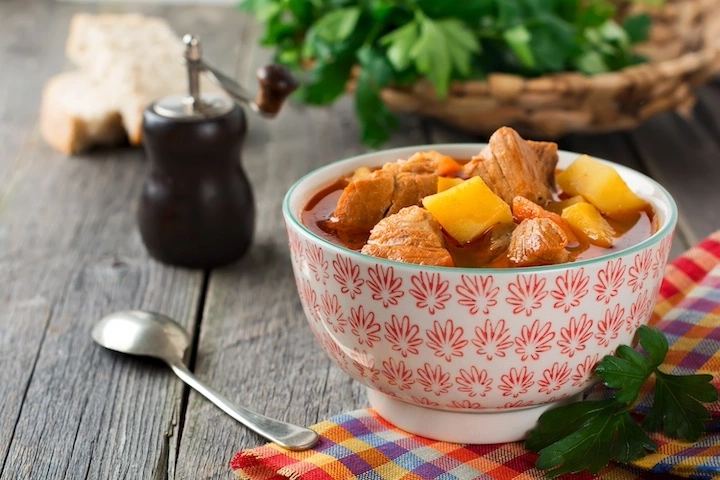
15 novembre 2024
An article by Chef Thibaud Santacroce (see biography at the end of this article)
I still remember my first meeting with Paul Bocuse. This experience marked a turning point in my approach to cooking. After 15 years behind the stove, 5 of them as a Chef, I had the chance to discover different culinary traditions around the world, from the United States to New Zealand, Australia and Switzerland.
This culinary journey has taught me one essential thing: the power of natural flavors is universal. Today, in my fusion cuisine, which blends American, Latin, Asian and European street food influences, essential oils, veritable concentrates of plants, have become precious allies in creating simple, natural recipes with a distinctive taste.
I've always used natural products in my cooking, and also for my health and well-being. It was through aromatherapy that I first came into contact with essential oils, discovering their many virtues for preventing or relieving various pains. Recognizing their aromatic power, one day I decided to try incorporating essential oils into my cooking. What a great surprise ! I continued my experiments and fine-tuning to come up with real recipes today.
A passionate self-taught enthusiast, I've learned to master these concentrated aromas with precision. While their use requires specific knowledge - some can be toxic or alter flavors if incorrectly dosed - essential oils can transform ordinary dishes into memorable creations. In this article, I share with you my techniques and tips for using essential oils safely, the fruit of years of experimentation around the world.
The use of essential oils in gastronomy is booming. More and more Michelin-starred chefs are incorporating these exceptional ingredients into their creations, in search of purer, more intense flavors. This trend also responds to growing consumer demand for natural ingredients and new taste experiences, while remaining eco-responsible.
Let's take a tour inside the realm of natural flavors and aromas.
Before going further...
Before proceeding further, this article is quite comprehensive and lengthy (it should take you a good ten minutes to read through). For those who won't have time to read the entire article, here are the 3 essential points to remember about using essential oils in cooking. Also, don't forget to check out my bonus section at the very end of this article, where you'll find a selection of my essential oils and favorites recipes.
Safety and quality first
Safety and quality are paramount when working with essential oils in the kitchen:
- Only use certified food-grade and organic essential oils
- Strictly follow HACCP protocols
- Train staff in proper usage practices
Dosage is crucial
Proper dosing is essential for success:
- Never exceed 1-2 drops per 250ml of preparation
- Always dilute in a fatty base before incorporation
- Adjust dosages according to dish type (marinades, sauces, broths)
Profitability for professionals
Essential oils offer significant advantages for professional kitchens:
- Excellent cost-effectiveness (one drop equals several grams of fresh herbs)
- Better stock management due to long shelf life
- Opportunity to create unique culinary signatures
These three aspects represent the pillars of successful essential oil use in professional cooking.
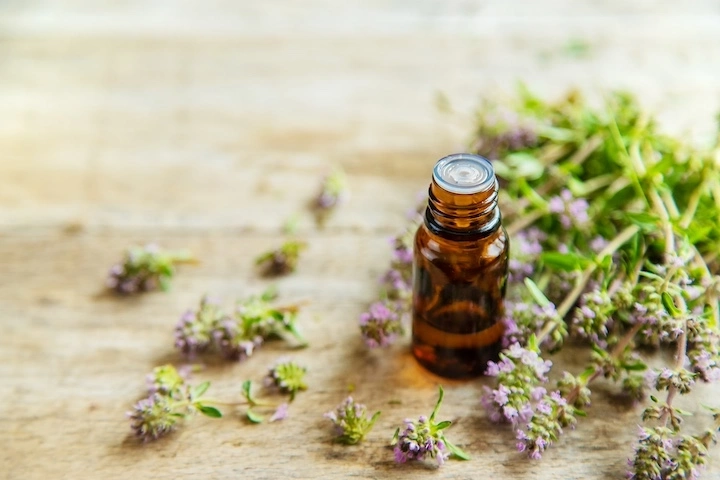
Fundamentals of essential oils in cooking
A food-grade essential oil is an aromatic concentrate obtained through distillation or cold pressing of aromatic plants. Like essential oils intended for therapeutic uses, those destined for culinary applications must meet stringent quality and purity standards.
Essential certifications
I exclusively work with certified organic and food-grade essential oils. These certifications ensure optimal quality for culinary use.
Professional equipment
In my kitchen, I utilize graduated pipettes for precise dosing, amber glass containers for storage, and precision scales. A tracking journal is also indispensable for recording successful dosages and combinations.
Winning combinations for savory cooking
Mediterranean essential oils
The Mediterranean basin offers an exceptional array of aromas that I employ daily in my cuisine. Basil essential oil, for instance, imparts an unparalleled freshness to tomato sauces and marinades. A single drop suffices to elevate 250ml of sauce.
Thyme essential oil, my faithful companion for roasted meats, pairs exquisitely with olive oil. I still vividly recall the first time I served my thyme-marinated lamb - the guests were astounded by the intensity of the aromas.
Rosemary essential oil, meanwhile, utterly transforms roasted potatoes. Here's a cherished tip I share with my team: incorporate one drop of rosemary essential oil into 100ml of olive oil before coating your potatoes.
Exotic essential oils
Exotic essential oils bring a novel dimension to traditional cuisine. Ginger essential oil, for example, elevates poultry marinades to new heights. Citronella essential oil, meanwhile, imparts a unique freshness to Asian broths.
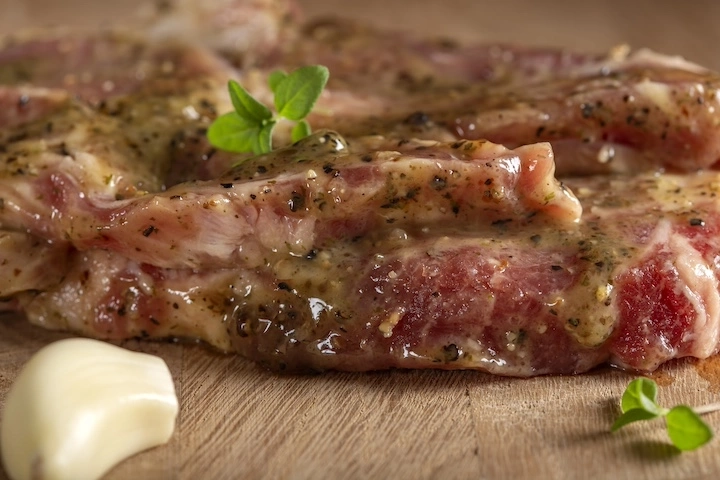
Stock management benefits
A major advantage for my kitchen brigade is simplified inventory management. Essential oils enable us to:
- Reduce fresh herb waste
- Get consistent year-round quality
- Optimize storage space
Practical applications: starting recipes
Discover these signature marinades and sauces that perfectly illustrate the use of essential oils in professional cooking. You will be able to find my favorite recipes and essential oils selection at the end of this article, in the Bonus section.
Mediterranean Marinade
Citrus Signature Sauce
- 200ml fresh cream
- 1 drop lemon essential oil
- 1 drop basil essential oil
- Salt and freshly ground pepper
Meat Marinades
Signature Lamb Recipe
The secret lies in the marinating time: minimum 12 hours to allow the essential oils to penetrate the meat.
Mediterranean Signature Sauce
- 200ml fresh cream
- 1 drop basil essential oil
- 1 drop thyme essential oil
- Salt and freshly ground pepper
Professional tip: incorporate essential oils at room temperature to preserve their aromas.
Signature Three-Oil Broth
- 1L vegetable broth
- 1 drop thyme essential oil
- 1 drop basil essential oil
- 1 drop rosemary essential oil
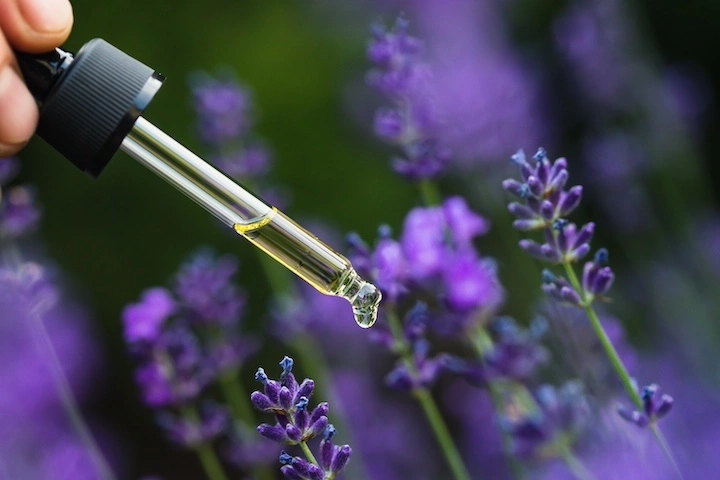
Expert dosage guide
Practical equivalences
- 1 drop basil essential oil = 10g fresh basil
- 1 drop thyme essential oil = 5g dried thyme
- 1 drop rosemary essential oil = 8g fresh rosemary
Professional cost-effectiveness
A 5ml bottle of thyme essential oil replaces approximately 750g of fresh herbs, with superior preservation.
Golden rules of dosage
For savory preparations, never exceed 1-2 drops of essential oil per 250ml. Always dilute essential oils in a fatty base before incorporation.
Recommended dilutions
|
Preparation Type |
Recommended Dosage |
|
Marinade |
1-2 drops/100ml oil |
|
Cold sauce |
1 drop/250ml |
|
Broth |
1-2 drops/500ml |
|
Vinaigrette |
1 drop/100ml |
Common mistakes to avoid
I still vividly recall my first disastrous experience with thyme essential oil: I used too much, and the dish was completely inedible! The most frequent mistakes are:
- Overdosing
- Direct incorporation without dilution
- Using in preparations that are too hot
Winning combinations for savory cooking
Mediterranean essential oils
As you've gathered, basil, thyme, and rosemary form the "holy trinity" of Mediterranean essential oils. Here's a tip I love sharing with my team: basil essential oil particularly elevates tomato sauces, while rosemary literally transforms grilled meat.
Exotic essential oils
Citronella and ginger essential oils are invaluable allies in Asian cuisine. Let me share a technique that creates quite a sensation in my restaurant: a Thai broth delicately perfumed with one drop of citronella and half a drop of ginger.
The layering technique
I've developed an aromatic layering technique I call "layering."
For a Mediterranean dish, here's how it works:
- Layer 1: thyme essential oil in the marinade
- Layer 2: rosemary essential oil during cooking
- Layer 3: basil essential oil as a finishing touch
This progressive layering of flavors creates depth and complexity in the dish, allowing each aromatic note to shine at different moments of the tasting experience.
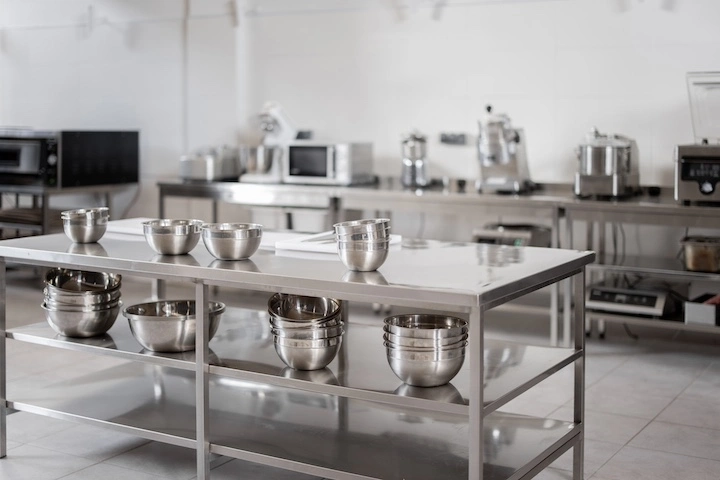
Safety and HACCP protocols
As a professional chef, food safety is my absolute priority. The use of essential oils in cooking requires particular rigor in respecting HACCP standards.
Storage protocols
In my kitchen, we follow strict storage protocols:
- Storage in airtight amber glass containers
- Constant temperature between 15 and 20°C
- Protected from direct light and humidity
- Precise labeling with opening date
Usage tracking
Every essential oil use is documented in a specific register that includes:
- Date of use
- Essential oil name
- Batch number
- Quantity used
- Dish concerned
This traceability is essential for ensuring food safety and maintaining our quality standards.
Staff training
I personally oversee my teams' training:
- Theoretical sessions on essential oil properties
- Practical dosage workshops
- Regular knowledge updates
- Periodic competency tests
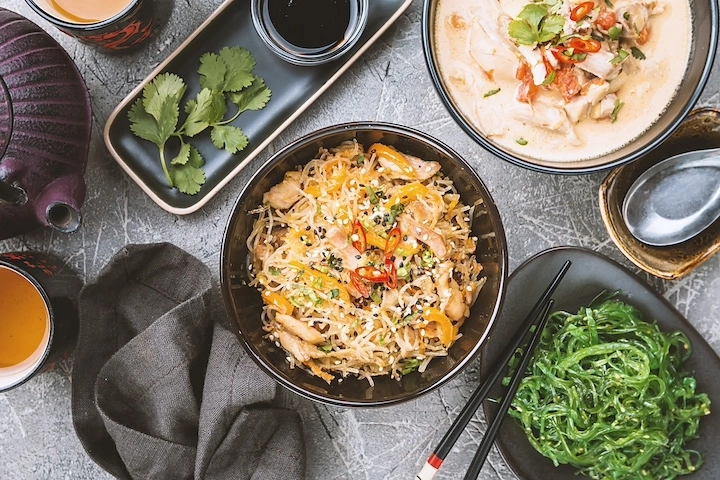
Essential oils in cooking: an art to master
Essential oils in savory cooking open up a world of new and refined flavors, but their use requires great caution. By respecting the principles of dosage, incorporation, and storage, you can elevate your dishes without making mistakes.
After traveling the world, from Paul Bocuse's kitchens to New York food trucks, I've learned that cooking is an ever-evolving art. Essential oils represent for me the perfect fusion between tradition and innovation, between French precision and international boldness.
Key points to remember
- Always choose food-grade certified essential oils
- Start with minimal dosages (1-2 drops)
- Document your experiments
- Train your team in best practices
Getting started
For beginners, I recommend starting with Mediterranean essential oils such as basil or thyme, which are easier to master, before venturing into more exotic flavors like citronella or ginger.

Why I choose Landema.com for essential oils
As a professional chef, selecting suppliers is crucial. Landema.com has earned my trust for several compelling reasons:
Professional quality assurance
- Certified organic and food-grade products
- Complete production-to-delivery traceability
- Systematic quality testing for each batch
Culinary expertise
- Specially curated range for professional kitchen use
- Accessible customer support via phone or email
Optimal cost-effectiveness
- Superior value for money
- Professional packaging options in various sizes
- Maximum shelf life through high-protection bottles
To elevate your culinary creations safely, join the community of chefs who trust Landema.com. Discover their range of certified essential oils for professional cooking by using the "Professional uses / Aroma - Food filter" on their online store.
Bonus: Chef Thibaud's favorite recipes
Here are a few recipes to start smoothly...
1. Citrus-Basil Vinaigrette
Ingredients:
- 5 tablespoons olive oil
- 1 tablespoon balsamic vinegar
- 1-2 drops lemon essential oil
- 1 drop basil essential oil
- Salt and pepper
Method:
- Mix all ingredients in a bowl
- Use to dress salads
2. Mint-Lemonade Infusion
Ingredients:
- 1 liter water
- 2 drops peppermint essential oil
- 1-2 tablespoons honey (optional)
- Lemon slices
Method:
- Heat water and add remaining ingredients
- Let infuse for a few minutes before serving chilled
3. Orange-Lavender Cake
Ingredients:
- 250g flour
- 150g sugar
- 100g melted butter
- 3 eggs
- 2 drops sweet orange essential oil
- 1 drop true lavender essential oil
- 1 packet baking powder
- Pinch of salt
Method:
- Preheat oven to 180°C
- Mix flour, baking powder, and salt
- Beat eggs with sugar, add melted butter and essential oils
- Combine wet and dry ingredients
- Bake for 30-35 minutes
4. Roasted Vegetables with Rosemary
Ingredients:
- 500g mixed vegetables (carrots, zucchini, potatoes)
- 2 tablespoons olive oil
- 2 drops rosemary essential oil
- Salt and pepper
Method:
- Preheat oven to 200°C
- Cut vegetables into pieces
- Toss with olive oil, rosemary essential oil, salt, and pepper
- Mix and roast for 25-30 minutes
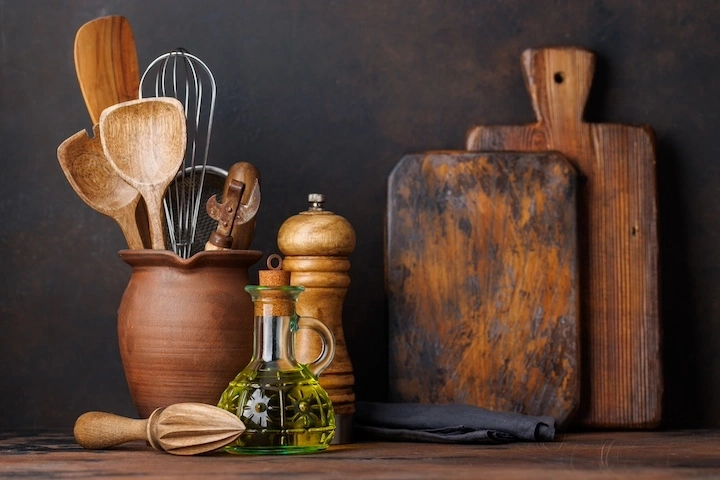
My favorite recipes
1. Basil Tomato Soup
Ingredients:
- 800g peeled tomatoes
- 1 onion
- 2 garlic cloves
- 1 tablespoon olive oil
- 1-2 drops Landema basil essential oil
- Salt and pepper
- Fresh basil for garnish
Method:
- Sauté minced onion and garlic until golden
- Add tomatoes and simmer for 15 minutes
- Blend until smooth
- Add basil essential oil, season to taste
- Serve hot with fresh basil
2. Lavender Panna Cotta
Ingredients:
- 400ml heavy cream
- 100ml milk
- 70g sugar
- 2 gelatin sheets
- 1 drop Landema true lavender essential oil
- Fresh berries for topping
Method:
- Soften gelatin in cold water
- Heat cream, milk, and sugar until dissolved
- Remove from heat, add drained gelatin
- Stir in true lavender essential oil
- Pour into ramekins and refrigerate for 4 hours
- Serve with fresh fruit
3. Orange-Ginger Smoothie
Ingredients:
- 2 peeled oranges
- 1 banana
- 200ml milk or almond milk
- 1 drop Landema sweet orange essential oil
- Fresh ginger or 1 drop ginger essential oil
Method:
- Blend all ingredients until smooth
- Adjust sweetness if needed
- Serve chilled with orange slice garnish
4. Thyme-Infused Chicken Sauté
Ingredients:
- 500g diced chicken
- 2 tablespoons olive oil
- 1 diced onion
- 1 diced red pepper
- 2 drops Landema thyme essential oil
- Salt and pepper
Method:
- Heat olive oil in pan
- Sauté onion and pepper until tender
- Add chicken and cook until golden
- Season with thyme essential oil, salt, and pepper
- Serve with rice or pasta
5. Orange-Scented Crêpes
Ingredients:
- 250g flour
- 3 eggs
- 500ml milk
- 2 tablespoons sugar
- 2 drops Landema sweet orange essential oil
- Butter for cooking
Method:
- Mix flour, eggs, and milk until smooth
- Add sugar and sweet orange essential oil
- Rest batter for 30 minutes
- Cook in buttered pan until golden
- Serve with sugar, honey, or fresh fruit
My essential oil selection guide
Remember, it is crucial to choose quality essential oils, 100% pure and organic.
Culinary essential oils that I frequently use:
- Lemon: Perfect for marinades and desserts; it stimulates digestion
- Peppermint: Ideal for desserts and beverages; it provides a fresh sensation
- Basil: Enhances salads and pasta dishes; it facilitates digestion
- Rosemary: Elevates meats and vegetables; it has antioxidant properties
- Sweet Orange: Adds sweetness to desserts and sweet and savory dishes
- True Lavender: Perfect for sweet dishes; it has relaxing properties
Chef Thibaud Santacroce's professional journey
A seasoned culinary professional with over 15 years of experience, including five years as Head Chef, Thibaud Santacroce has carved a unique path in the culinary world. After completing his Advanced Technical Diploma in Hotel and Restaurant Management, he had the privilege of working abroad under the mentorship of the legendary Paul Bocuse.
His culinary odyssey has taken him across the globe, from the United States to New Zealand, with significant stops in Australia and Switzerland. These diverse experiences have profoundly shaped his culinary perspective and expertise.
Today, Santacroce's culinary style represents a vibrant fusion of street food influences, masterfully blending American, Latin, Asian, and European cuisines. Since returning to France, he has been pursuing his dream of launching his own food truck, aspiring to introduce global flavors to discerning palates through his signature recipes that are simple, natural, and boldly flavored.
His passion for culinary innovation and dedication to natural ingredients has led him to become an expert in the use of essential oils in professional cooking, transforming ordinary dishes into extraordinary culinary experiences.
Items that could
interest
Our essential oils
will simplify your life
FAQ
As a customer of the Landema website, did you know that we also have a physical store? If you live in the Landes, in New Aquitaine or are planning to stay there, do not hesitate to visit us! We are located in Le Sen, on the Biolandes site, very close to Labrit, Roquefort, and Mont-de-Marsan, in the heart of the Landes de Gascogne regional natural park.
Essential oils are natural aromatic substances extracted from plants. They are often used in aromatherapy for their health and wellness benefits. Essential oils can be extracted from different parts of plants, such as leaves, flowers, barks, roots or seeds. The use of essential oils dates back to ancient times, where they were used for their medicinal properties and to perfume cosmetics and skincare products.
Landema invites you to discover our product range composed of essential oils, absolutes, vegetable oils, macerates or hydrosols. Our catalog will grow over time, stay informed by subscribing to our newsletter.
We invite you to discover our practical guides and our blog where you can discover our advice and our cases of use of essential oils.
Your wishlist
You must be logged in to post a comment.
Login, or create an account
There is no comment for this article yet